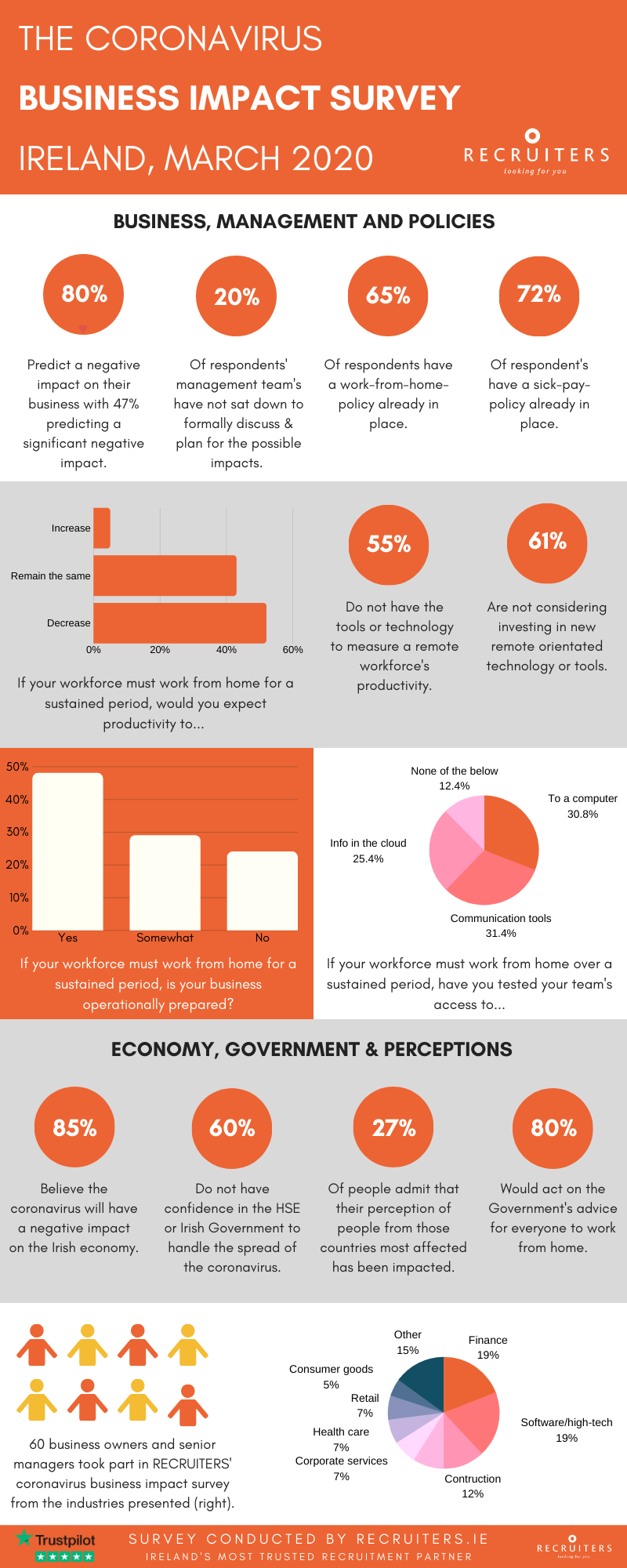Remote working is a relatively new concept of working in Ireland. But like it or loath it, we are all entering into the biggest remote working experiment of all time due to the Coronavirus. My guess is that we’ll come out of the current crisis with a more flexible working environment than the one that preceded it. Irish businesses must be Coronavirus prepared and here's some helpful advice to help you.
While many aspects of remote work have become easier, a concern that still plagues employers and employees alike in Ireland is around productivity:
RECRUITERS recently carried out a survey on the business impacts of the Coronavirus with business professionals across Ireland. Fifty percent of respondents expect productivity to decrease if their workforce works from home for a sustained period. In fact, only 5% predict an increase in productivity.

Studies show that remote workers get more done than their in-office counterparts. However, how can Irish employers and employees ensure this during the recent COVID-19 crisis and beyond?
As the saying goes; If it doesn’t get measured, it doesn’t get done. Maintaining a results-orientated culture will ensure everyone’s productivity is measured by their results regardless of where they are. Every team should set their own goals and work towards achieving them. Remember, it’s important to measure based on results and not on how many hours people have been working.
In the same way you would with your teams in the office, communicate clear goals and deadlines. The team here at RECRUITERS uses our CRM to track activity and progress but there are plenty of helpful apps such as PivotalTracker and Basecamp, which we’ll come to later.
We all know and understand team plans but ‘people plans’ are really helpful. The aim of your 'people plans' are to tie individuals close to the team plan and what’s required from everyone in order to keep projects progressing. Each person on the team should check in daily (or as needed) with clear expectations and clear feedback. Leadership will be key!
Measure productivity by the number of important tasks you and your team have managed to resolve or complete per week. This is a great measure of efficiency. Important tasks will depend on your teams’ function, for example, support teams will want to analyze tasks that directly helped clients resolve issues they had or will make clients’ lives easier, so issues will be prevented in the near future.
When tracking these tasks, it’s important to focus more on priorities than on numeric goals. Set priorities frequently and clearly with your team when working remotely and measure them by how much progress you have made on those priorities in a given time frame.
Above all else, trust your employees. We talked about trusting your employees during a crisis before but just to re-iterate, working remotely inherently requires letting go of a measure of control. And when it all boils down, you’ll find everyone is quite honest about their remote workflow and usually, it’s quite clear to tell the amount of work being done and if things are moving faster or slower than usual. Call these things out and as we already mentioned, hold people accountable.
Not everyone can work from home or a remote office. But if you've hired self-starters who are intrinsically motivated for such positions, that's all the tracking you need
Time Doctor is a great tool for tracking time for remote employees. However, in my opinion, if you’re relying on a tool to measure time, you’re after the wrong metric. We all know how easy it is to make a five-hour task to take ten hours. Instead, understand before you assign work about how long it will take, and make sure it gets done in or around the required time.
Tickspot is a great tool for ensuring projects stay on budget. It also integrates directly with basecamp and allows all members to see in real-time how close to finishing a project they are and where they are with the budget.
Ironically, tracking projects and time can also be a massive waste of time. Instead, iDoneThis is a great tool for tracking your team’s achievements, such as created a new landing page or signed off on quarter one accounts.
If you’re like me, you love ticking your “to-dos” off your list. Basecamp is a great tool that shows everyone on your team when a task on a particular project has been completed. It’s real-time and really handy! The marketing function at RECRUITERS uses it with our web development team really easily and efficiently.
It's an exciting time for all companies. Be sure to embrace the challenge of change and take every learning. It will stand to you and your business in the future!
Written by Andrew Sheehan
 Andrew Sheehan is the Marketing Manager at RECRUITERS.
Andrew Sheehan is the Marketing Manager at RECRUITERS.